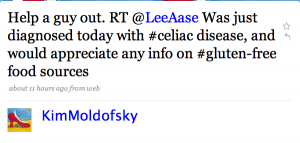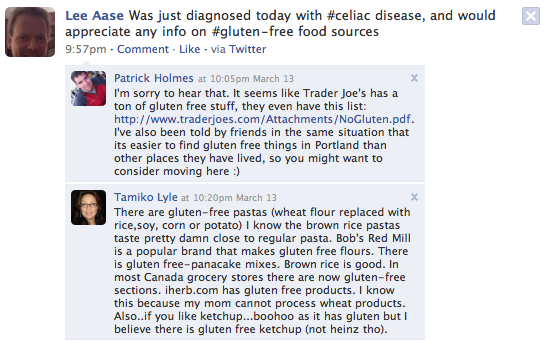In many ways, SMUG has been my personal laboratory for learning about social media and how I can apply these tools to my work at Mayo Clinic. I’ve been able to experiment with blogs, Facebook, Twitter, YouTube and other platforms with my personal accounts, which then helps me see how they can be used for a health care provider like Mayo Clinic.
So we’ve established a Mayo Clinic YouTube channel, a Facebook page, and several podcasts and blogs — including, most recently, Sharing Mayo Clinic.
As of Friday the 13th, however, I’m also approaching social media from the patient perspective: yesterday I was diagnosed as having celiac disease.
So what did I do to find good information about how to cope?
My first step, of course, was the celiac disease section on MayoClinic.com.
And I recalled that my team at work had produced a TV story about living with celiac disease, which is also on our Mayo Clinic YouTube channel:
[youtube=http://www.youtube.com/watch?v=yGmWf0et4hg]
But I also turned to Twitter, and was amazed at the response.
@KimMoldofsky re-tweeted my call for help:
Bonnie Sayers (@autismfamily) alerted me to the #gfree hashtag and the Gluten Free Twitter Party she’s hosting on April 3.
@FrannLeach shared a Gluten Intolerance group on Squidoo, along with some recipes.
Kayla Eubanks (@BallinOnABudget) told me about Pizza Fusion, and Nina (@lovingyouiseasy) pointed me to @wholefoods and @KarinasKitchen. Karina’s “The Morning after the Diagnosis” post on her blog was particularly helpful. Kristie S. (@KristieTweets) had a couple of suggestions, and Tom Stitt (@tstitt) helped me get an answer as to whether Coke is OK (it is!) I also found out about lots of resources available at celiac.com.
And because I Tweeted about it, my celiac disease diagnosis also was posted to my Facebook profile:
…which led to several Wall comments (including a couple you see above that came within a half hour of my Tweet), and also some messages in my Facebook inbox. And I also found a Celiac Disease group in Facebook.
Some people are justifiably concerned about potential dangers of self-diagnosis through the Internet, but once a diagnosis has been made, social media tools are extremely powerful means of getting information and gathering support.
As I write this, I’ve had my diagnosis of celiac disease for about 34 hours, and the learning about the condition I’ve been able to do in this time has been amazing.
And out of this experience, I’m also going to be getting my wife Lisa (@LisaAase) to use her Twitter account to participate in the #gfree discussions. She set up her account nearly two years ago, but has only done a dozen updates. And right now I’m her only follower. But now she has a reason to use Twitter, and I think she’s going to find it helpful in learning how we deal with gluten in our family diet.



Lee, thank you for this post.
Technology embeds itself in our lives when it solves a problem – for you this weekend, information and support, needed quickly.
I am thinking about when my daughter was diagnosed with ADD about eight years ago. We did all we could to learn about her condition, but had none of these wonderful tools. She’s doing well now, but having these back in 2001 would have made a big difference for her and for us.
See you in Baltimore!
Yes, it’s been extremely rewarding to make all of these connections so quickly and easily. My having been involved in Twitter for a couple of years undoubtedly has helped accelerate my learning curve, since my network is a somewhat larger than many patients’ would be…but it definitely is a case study for how a newly diagnosed patient can find not only authoritative info from providers, but also helpful tips and support from peers. I’m very much looking forward to seeing you in Baltimore as well!
Hi Lee,
Sorry to hear about the diagnosis, but isn’t it wonderful the support you’ve found. It’s really amazing. Thanks for sharing your meaningful story.
You’ve probably already learned about this, but just in case you hadn’t heard, I want to make sure you know that Rochester has a store dedicated to your disease called Gluten Free Cupboard.
Julia
Hi Lee
Saw you present at BlogWell in Chicago. Really interesting to hear your personal story here. Sorry to hear about the condition, but really powewful to experience the great power or SM for help, support, answers.
Thanks for posting.
TO’B
sorry to hear about the diagnosis. I trust you caught it early and diet is the best remedy. I also hope you find some new foods that you love that you may have never tried. Hopfully it will not prevent us from the beverage of your choice.
All the best
Albert
I’ve been really busy at work and behind on Twitter so I missed your tweet on your diagnosis! Sorry to hear about it, but I’m sure you will be a very good patient and stay well! I was just looking for a good link to tweet when I came to this post.
Take care,
Nancy
Eating gluten-free has never been easier…there are wonderful products on the market at the health-food stores and main stream supermarkets. One of my family’s favorites is Pamela’s Baking Mix – great pancakes and muffins. Also DeLand Bakery makes gluten-free breads – more expensive but good texture. A good website for cooking tips is Glutenfreegirl.blogspot.com. You and your family will find yourself on the other side of the learning curve in no time. Jen
Welcome to the GF tribe, we are the best!
king arthur flour catalog and web site has a ton of gf baking ingredients and recipes
Surprised to find that both Lee and Gonzalo are also GF! I’ve just passed my first year anniversary of going gluten free, and just discovered that our exchange student didn’t understand my explanations and has been contaminating almost everything in the fridge. Urgh. 🙂 I need a graphics-only language-free tool to explain how to live with a celiac and not hurt them. There’s a project for a tribe!